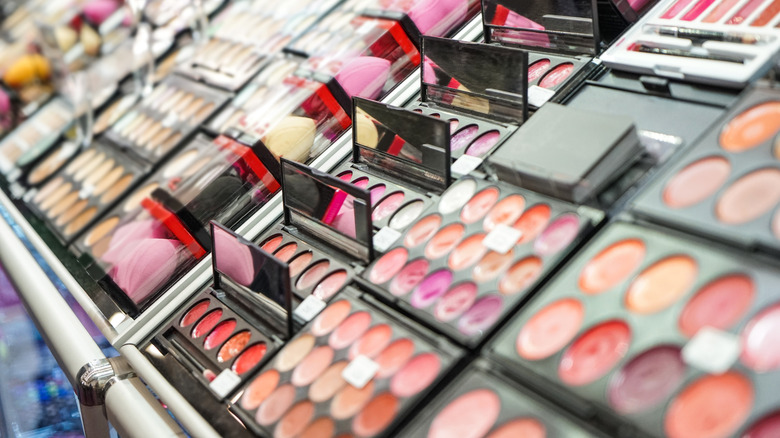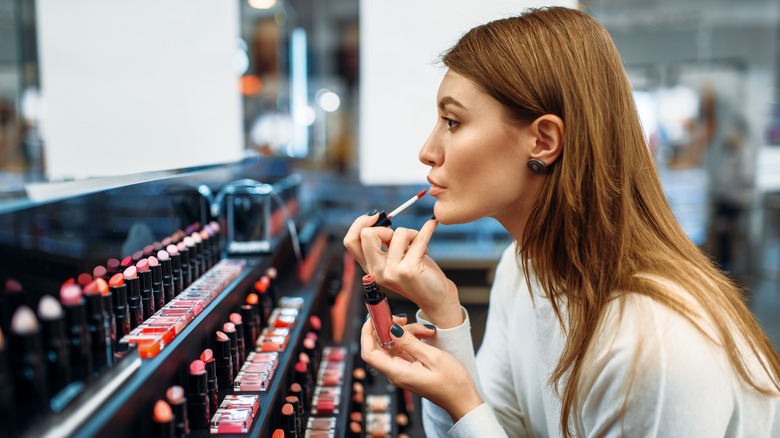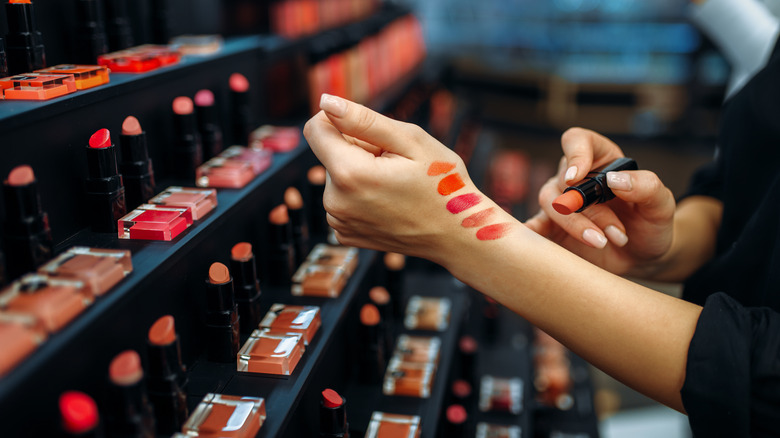Makeup Testers: Are They Safe To Use?
Strolling inside a beauty store can be both thrilling and overwhelming. There are hundreds if not thousands, of products on the market, and picking something you want can be a lengthy process. Although most beauty stores have a favorable return policy for customers, heading back to the store can no doubt be a hassle. One way to endure the process of elimination is by testing the makeup you want in the store. Nearly every big-name beauty retailer has an available product on display, whether it be foundation, lipstick, and more, with disposable makeup sponges, lip brushes, and other applicators for consumers to use.
In 2020, amid the COVID-19 Pandemic, stores like Ulta and Sephora opted to get rid of their makeup testers, citing health concerns. This prompted innovations like GLAMlab by Ulta, a virtual makeup experience, viral beauty consultants, and added flexibility for returns. Prama Bhatt, Ulta Beauty's chief digital officer, explained to CNN why these changes were significant. She said, "We know how much fun it can be to discover, try on and find the right items on your own. But safety is paramount right now." However, as COVID restrictions eased, makeup testers made a comeback in 2021. But does that mean you should use them?
Studies indicates that makeup testers harbor bacteria
Despite beauty retailers increasing their sanitation measures since COVID-19, experts warn against using makeup testers. In 2018, an investigation conducted by the CBC in Toronto discovered that makeup testers at stores like Sephora and MAC Cosmetics had mold and Staphylococcus aureus bacteria (staph). The latter can trigger eye and skin infections. The CBC swabbed testers, such as eyeshadow, mascara, and cream blush, and tested them at a lab. They spoke to employees who previously worked at these stores and were told that they either didn't disinfect the products or only did so when a customer asked to try a product on.
WCNC reported that a study conducted on makeup testers at various Charlotte, North Carolina, stores had similar results. E.coli and Methicillin-resistant Staphylococcus aureus (MRSA) were discovered on the products. Infectious disease specialist Dr. Arash Poursina explained to WCNC why he believes no one should use makeup testers. He said, "You go to a department store, if they have put a toothbrush over there for everybody to try and see how good that toothbrush is, you would not if 50 other people have brushed their teeth with that toothbrush." Poursina added, "Why would you pick up a lipstick and use it? It's the same thing."
This is how to properly use makeup testers at the store
Makeup tester or not, cosmetics, which are full of preservatives, offer the perfect breeding ground for bacteria and pathogens. It would be best to never put dirty fingers in your makeup or have it in a damp place. It's also why you shouldn't be lazy about cleaning your makeup brushes. The dirty truth about makeup brushes and these actions is that they increase the chances of bacteria forming in your favorite products. Other health issues that can arise from using unsanitary cosmetics or makeup testers include pink eye and herpes. In 2017, a woman sued Sephora for allegedly developing oral herpes after she used one of their lipstick testers.
If you find yourself at a beauty store and have the itch to test out products, there are ways to do so safely. Makeup artist Susie Sobol told Allure that moist products, like lipstick or cream products, are likely to have more bacteria than other items. Experts recommend never trying a product that has to go on your lips or eyelashes. If you want to swatch a product, use your wrist, hand, or palm.
Most stores have spray bottles with alcohol; experts note that you should spray the product you want to test out before swatching it. If you would rather not use a makeup tester on display, you could ask for a store employee to open a new one for you, and if they don't oblige, you could always purchase and return the product if it's not your liking.


